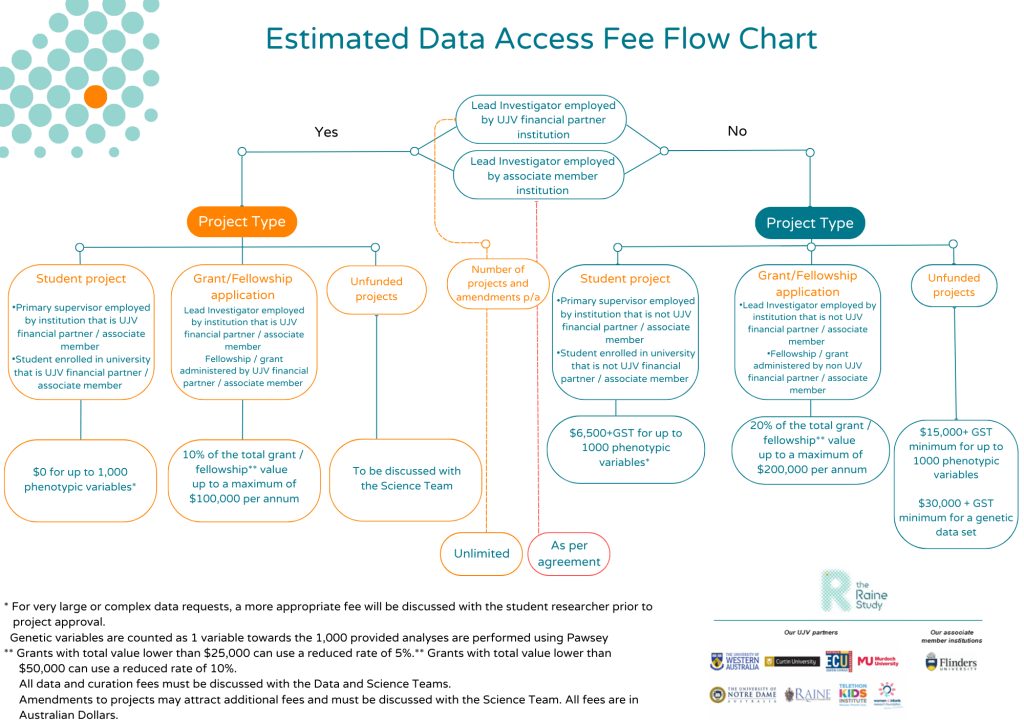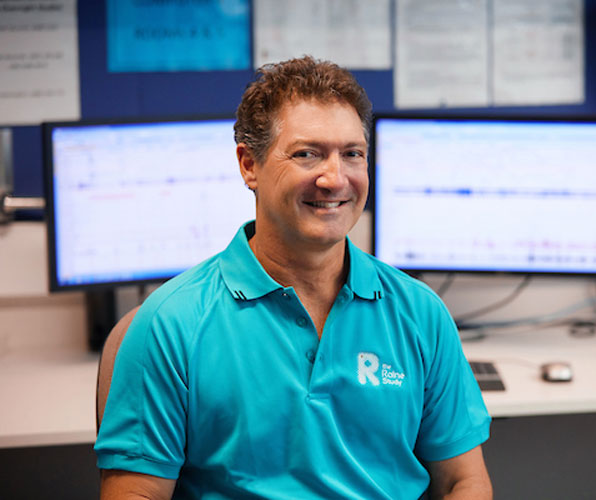For Researchers
Fantastic news! The first step is to have a conversation with a Scientific Management Committee member about your idea. You can contact the Scientific Manager.
All new project applications involving the Raine Study resources go through a review process that takes on average 6 to 8 weeks. You can find more about this process here.
Fantastic news! The first step is to have a conversation with our Scientific Management Committee about your idea. You can contact the Scientific Manager. All new grant/fellowship applications related to projects involving the Raine Study existing data and/or biosamples or a proposal for collection of new data and/or biosamples go through a review process that takes on average 6-8 weeks.
You will need to get provisional approval from the Raine Study prior to submitting your application to a funding agency. All grant/fellowship applications must include financial support for data access and ongoing curation of the Raine Study resources and should cover the total cost of the research project, including any data or biosample retrieval or collection and biosample analysis. You can find more about this process here.
Some funding bodies require an expression of interest (EoI) as the first step in a grant/fellowship application. Commonly, an EoI comprises a short summary of the project idea and precedes a full application. Researchers planning to submit a grant/fellowship EoI that proposes the use of Raine Study data should contact the Raine Study Scientific Manager or Scientific Director and discuss the project idea as part of the pre-application process. If the researcher successfully moves into the full grant/fellowship application stage, a project application needs to be submitted in ROSS. The full grant/fellowship application can only be submitted to the funding body after being approved by the Raine Study.
There are several steps to working with the Raine Study. The first step is project pre-application, which involves having an initial conversation with our team.
Following this, you then need to go through the project application process using the Raine Online Submission System (ROSS). Once the project application is submitted via ROSS, the review and approval process takes on average 6-8 weeks. You can find more about this process here.
Once the project is approved by the Raine Study and by a HREC, you can then apply for data and/or biosamples access. The time of data extraction varies according to the amount and type of data requested.
That depends on the type of project. You should email the Raine Study Scientific Management Committee to discuss this.
Curation and access fees varies depending on what data and/or biosamples you access and whether you are part of a UJV financial partner organisation or institutional associate member organisation (i.e. our financial partners).
For grant/fellowship applications:
All grant/fellowship applications need to include requests to support data access and ongoing curation of the Raine Study resources.
For researchers employed by a Raine Study UJV financial partner organisation: This is currently set at 10% of the total grant value, to a maximum curation and access fee of $100,000.
For researchers employed by other organisations or grants administered by other organisations: A curation and access fee is currently set at 20% of the total grant value, to a maximum fee of $200,000. Grants for less than $25,000 can use a reduced rate of 5% and grants less than $50,000 can use a reduced rate of 10%.
Where the Raine Study resources represent only a part of a larger study, then the Raine Study curation and access fees may be reduced in proportion to the contribution to the overall study. Any potential reduction in the Raine Study fees will need to be negotiated before project approval and will take into consideration the capacity of the funding agency to provide funds, the value of the project to UJV financial partner researchers and to capacity building in Western Australia.
For fellowship applications where the scheme either provides no project costs or small amounts of project costs, no curation and access fee will be set for projects lead by UJV financial partner or institutional associate member researchers. For projects lead by researchers from other organisations, an amount will be negotiated based on the financial capacity of the award. In most cases the Raine Study would expect a minimum contribution of $15,000 for a ‘standard’ phenotypic data set and $30,000 for a genetic data set.

All project applications and data/biosamples access requests are done via the Raine Online Submission System (ROSS).
If you do not have an account yet, please email the Raine Study.
If you already have an account, you can access ROSS here.
Please note you can only apply to access data/biosamples after your project has been approved by the Raine Study. For new projects, the review and approval process takes on average 6-8 weeks. You can find more about this process here.
The Raine Study has collected data on our families at various time points over the last 30 years.
Comprehensive and detailed information has been collected from the mothers (Gen1) in early pregnancy and children born into the Raine Study (Gen2) since birth. More recently, data from Gen2 grandparents (Gen0) and Gen2 offspring (Gen3) has also been collected.
Data includes questionnaire data, clinical assessment information and biological sample results. A full overview of information collected for each generation at each follow-up is available on our Available Data page.
ROSS is our Raine Online Submission System, developed specifically for the Raine Study as an efficient way to manage all research projects.
Every researcher using the Raine Study resources will use ROSS to submit a project application, data and/or biosamples access requests, and get manuscripts approved.
If you do not have an account yet, please email the Raine Study.
If you already have an account, you can access ROSS here.
You can also find Word templates of the forms used in ROSS (that can be used to circulate drafts among co-investigators before completing the final online version in ROSS) under our Commonly Used Resources page.
Email the Raine Study and we can help you with any questions or difficulties using ROSS.
Participant engagement is important to us at the Raine Study, and is now a critical step in the grant application process for most of the major funding bodies. If you would like participants involved in providing feedback from the early stages of your research project idea, we can help facilitate that. Email the Raine Study to set up a discussion with our Participant Engagement team.
We follow the guidelines for consumer involvement in research published by the Western Australian Health Translation Network‘s Consumer and Community Involvement Program, which can be found here.
All researcher publishing manuscripts that used the Raine Study resources need to acknowledge the Raine Study participants, staff and funding sources.
Nomenclature and Acknowledgement guidelines can be found on our Commonly Used Resources page.
All researcher publishing manuscripts that used the Raine Study resources need to use the correct nomenclature when referring to the Raine Study, our participants and follow-ups.
Nomenclature and Acknowledgement guidelines can be found on our Commonly Used Resources page.
Email the Raine Study and we will put you in touch with one of our Special Interest Group leaders or experienced Raine Study researchers with expertise in your research area.
We would love to help you promote your published research findings.
You can upload a draft media release using ROSS or email our Communications Manager to assist you in preparing and approving any media promotion material.
Great question! We have a Researcher Engagement Policy which outlines how researchers should engage with the Raine Study.
You can access the Researcher Engagement Policy on our Commonly Used Resources page.
The Raine Study is registered in the Australian New Zealand Clinical Trials Registry.
Trial ID: ACTRN12617001599369.
Additional resources
For more information, please contact the Raine Study.

